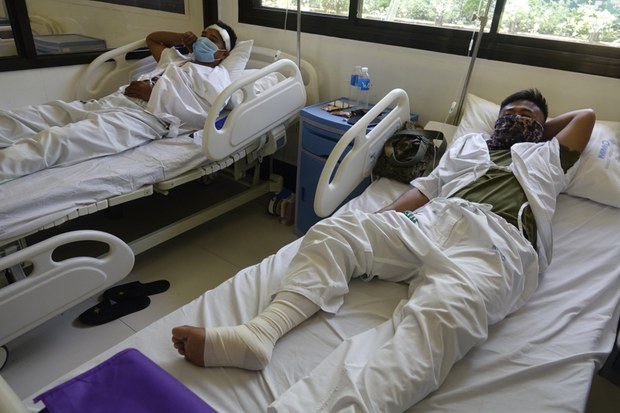Two Suicide Bombers Involved in Jolo Attack, Philippine Military Says
2020.08.25
Zamboanga and Cotabato City, Philippines
 Soldiers who were injured in a suicide bomb attack in Jolo, southern Philippines, recuperate at a hospital in nearby Zamboanga City, Aug. 25, 2020.
Soldiers who were injured in a suicide bomb attack in Jolo, southern Philippines, recuperate at a hospital in nearby Zamboanga City, Aug. 25, 2020.
A second suicide bomber participated in explosions that killed at least 14 people and injured scores more in the southern Philippines, senior military officials said Tuesday, as government forces hunted for pro-Islamic State militants believed to be behind the attack the day before.
Also on Tuesday, the Philippine Army chief revealed that the head of Islamic State’s (IS) Philippine affiliate may have died of injuries suffered during a clash with government forces last month, but said that his fate remained unknown.
Monday’s attack on Jolo Island was the first suicide bombing this year in the restive southern region by suspected members of the Abu Sayyaf Group, and the deadliest since a twin suicide attack targeted a church in Jolo in January 2019.
As many as 75 people were injured in the latest attack. In the immediate aftermath, officials had said that the first bomb was rigged to a motorcycle and only one suicide bomber – believed to be a woman – set off the second bomb. On Tuesday, officials discounted the initial theory that the motorbike was used in the attack. In addition to the two bombers, 14 people were killed.
“There were two. The first was also a suicide bomber. That has been validated,” Army chief Lt. Gen. Cirilito Sobejana said, adding he was recommending that Jolo Island and the surrounding Sulu province be placed under martial law to prevent further attacks.
The military said it believed the attacks were planned by Mundi Sawadjaan, a bomb maker who is believed to be a nephew of Hatib Hajan Sawadjaan, an Abu Sayyaf leader who commands the IS branch in the Philippines.
Sobejana said that Hatib Hajan Sawadjaan may have died after being injured in an encounter with government security forces in early July.
“We think he may be dead, but we are not declaring it officially, unless we get the body and we have proof of death,” Sobejana told reporters on Tuesday.
Authorities had blamed the Philippine IS leader for last year’s suicide attack, which was allegedly carried out by an Indonesian couple and left nearly two dozen people dead at a church in Jolo.
Philippine President Rodrigo Duterte so far has not commented on Monday’s attack, and any decision on martial law needs his approval. Meanwhile, Jolo will temporarily remain under lockdown as security forces hunt for suspects linked to the bombings, officials said.
Brig. Gen. William Gonzales, commander of military forces in Jolo, said security had been heightened on the island.
“Our operation is ongoing against this Abu Sayyaf group who perpetrated the bombing,” Gonzales said. “We have intensified our intelligence monitoring and security protocols to include setting up checkpoints and identifying vulnerable targets.”
New evidence
Sobejana said the first explosion on Monday was initially thought to have been caused by a device planted on a motorcycle, but new evidence showed that the blast was caused by a suicide bomber. CCTV footage and witness testimonies indicated that the motorcycle could not have caused the first explosion, he said. The second blast was triggered by a teenage girl.
Gonzalez concurred with the new findings.
“Based on the investigation of the EOD [explosive ordnance disposal], the bomb experts, the first blast was not caused by a bomb-laden motorcycle,” he said.
Sobejana emphasized that the possible identities of the suspects were being withheld for security reasons and as more investigations were being conducted. While it was determined on Monday that the second bomber was a teenage girl who had talked to a soldier right before detonating her bomb, Gonzalez said both attackers’ bodies were too damaged to be identified from their remains.
‘Younger and younger suicide bombers’
Some analysts believe that a foreign national or nationals may have been involved in Monday’s attacks.
Counterterrorism expert Rommel Banlaoi of the Philippine Institute for Peace, Violence and Terrorism Research said there were signs that the attacks were “IS-directed, family terrorism in play.”
“There are reports that one of the bombers is an Egyptian national of Moroccan descent,” Banlaoi told BenarNews, citing his own sources. “What is worrying here is that the militants are training younger and younger suicide bombers.”
SITE Intelligence, a U.S.-based group that monitors online communications among Muslim militant groups, reported that IS East Asia Province had issued a statement claiming responsibility for Monday’s attacks in Jolo.
Monday’s attacks were meant as retaliation for ongoing military operations against Abu Sayyaf Group members on the island, said Sidney Jones, director of the Jakarta-based Institute for Policy Analysis of Conflict.
“This could be a combination of local ASG clan dynamics. [And] a response to the military operation and [an] assertion of ISIS’ continued presence in the southern Philippines,” Jones told BenarNews.
Meanwhile, the United States and Britain were among countries that issued statements deploring the militant attack on Jolo Island and offering condolences for the victims’ families.
“We condemn these senseless attacks and stand by the people of the Philippines,” the U.S. State Department’s Bureau of East Asian and Pacific Affairs said.
Sung Kim, the American envoy to Manila, said the Philippines had Washington’s support in the fight against terror.
“I offer my sincerest condolences to the families and friends of the victims of yesterday’s bombings in Jolo,” Kim said. “We join the Philippine government in condemning these attacks and will continue to support our Filipino partners to strengthen national security.”
Jeoffrey Maitem and Mark Navales, and Froilan Gallardo and Richel V. Umel, contributed to this report from Cotabato City and Cagayan de Oro, Philippines.







